
Cecil Day-Lewis, often written as C. Day-Lewis, was an Irish-born, British poet and Poet Laureate from 1968 until his death in 1972. He also wrote mystery stories under the pseudonym of Nicholas Blake.

HM Prison Manchester is a high-security men's prison in Manchester, England, operated by Her Majesty's Prison Service. It is still commonly referred to as Strangeways, which was its former official name derived from the area in which it is located, until it was rebuilt following a major riot in 1990.
Nigel Strangeways is a fictional British private detective created by Cecil Day-Lewis, writing under the pen name of Nicholas Blake. He was one of the prominent detectives of the Golden Age of Detective Fiction, appearing in sixteen novels between 1935 and 1966. He also features in a couple of short stories.

The Sad Variety is a 1964 thriller novel written by the Anglo-Irish writer Cecil Day-Lewis, written under the pen name of Nicholas Blake. It is the fifteenth and penultimate entry into the series featuring the private detective Nigel Strangeways. It marked a move away from the murder mysterys of the earlier novels into the then-fashionable spy novel genre.
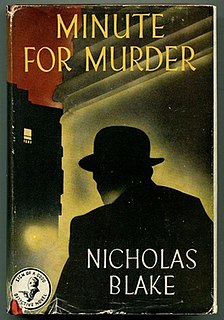
Minute for Murder is a 1947 crime novel by Cecil Day-Lewis, written under the pen name of Nicholas Blake. It is the eight in a series of novels featuring the private detective Nigel Strangeways, and the first published following the Second World War. The hero begins the film employed at the Ministry of Morale, modelled on the Ministry of Information that Day-Lewis had worked for during wartime.

The High Sheriff is a 1937 mystery detective novel by the British writer Henry Wade. Wade was a writer of the Golden Age of Detective Fiction, best known for his series featuring Inspector Poole. This was one of a number of stand-alone novels he wrote, structured as a partially inverted detective story.
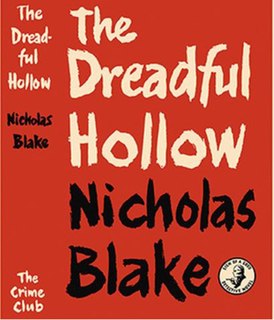
The Dreadful Hollow is a 1953 detective novel by Cecil Day-Lewis, written under the pen name of Nicholas Blake. It is the tenth in a series of novels featuring the private detective Nigel Strangeways.

The Worm of Death is a 1961 detective novel by the Anglo-Irish writer Cecil Day-Lewis, written under the pen name of Nicholas Blake. It is the fourteenth in a series of novels featuring the private detective Nigel Strangeways.
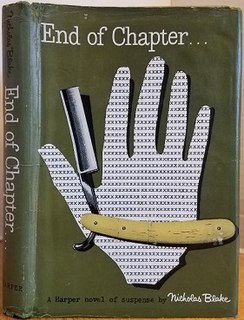
End of Chapter is a 1957 detective novel by Cecil Day-Lewis, written under the pen name of Nicholas Blake. It is the twelfth in a series of novels featuring the private detective Nigel Strangeways.

The Widow's Cruise is a 1959 British detective novel by Cecil Day-Lewis, written under the pen name of Nicholas Blake. It is the thirteenth in a series of novels featuring the private detective Nigel Strangeways.
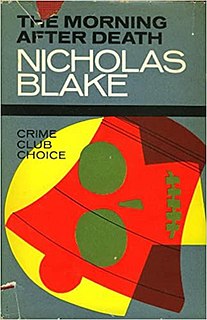
The Morning after Death is a 1966 detective novel by Cecil Day-Lewis, written under the pen name of Nicholas Blake. It is the sixteenth and last entry in the series of novels featuring the private detective Nigel Strangeways.

The Whisper in the Gloom is a 1954 detective novel by Cecil Day-Lewis, written under the pen name of Nicholas Blake. It is the eleventh in a series of novels featuring the private detective Nigel Strangeways. The novel introduced the recurring character of Clare Massinger, a young sculptress, who becomes a romantic interest of Strangeways.

A Penknife in My Heart is a 1958 crime thriller novel by Cecil Day-Lewis, written under the pen name of Nicholas Blake. It was one of four stand-alone novels he wrote alongside the Nigel Strangeways detective novels.
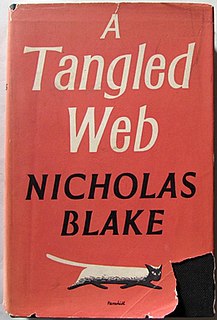
A Tangled Web is a 1956 British crime novel by Cecil Day-Lewis, written under the pen name of Nicholas Blake. It was one of four stand-alone novels he wrote under the name alongside the Nigel Strangeways detective novels. It was published by Harper in the United States under the alternative title Death and Daisy Bland.
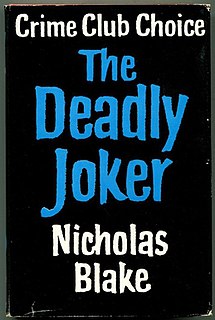
The Deadly Joker is a 1963 mystery novel by the Anglo-Irish writer Cecil Day-Lewis, under his pen name of Nicholas Blake. It was one of four stand-alone novels he wrote under the name alongside the Nigel Strangeways detective novels. It is unusual for the author for being written in a first person narrative from the prospective of the protagonist John Waterson.
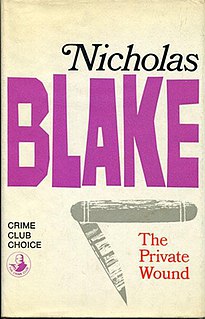
The Private Wound is a 1968 mystery thriller novel by Cecil Day-Lewis, written under the pen name of Nicholas Blake. It was one of four stand-alone novels he wrote alongside the Nigel Strangeways detective novels. The title is taken from a line in William Shakespeare's Two Gentlemen of Verona. It was a runner-up for the Gold Dagger Award of the British Crime Writers' Association.
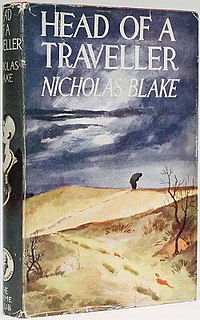
Head of a Traveller is a 1949 detective novel by Cecil Day-Lewis, written under the pen name of Nicholas Blake. It is the ninth in a series of novels featuring the private detective Nigel Strangeways.

A Question of Proof is a 1935 detective novel by Cecil Day-Lewis, written under the pen name of Nicholas Blake. It is the first in a series of novels featuring the private detective Nigel Strangeways. Day-Lewis chose to write under an assumed name as he feared writing in the popular detective genre would harm his growing reputation as a serious-minded poet. Consequently, the publishers Collins advertised the book as being written by a "well-known writer" using a pen name. It was a commercial success selling around 200,000 copies in Britain and launching Day-Lewis, who quickly did become widely identified as the author, as one of the leading writers of the Golden Age of Detective Fiction.
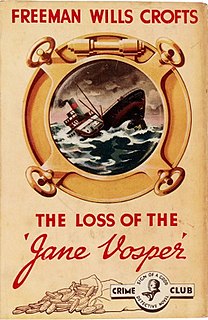
The Loss of the Jane Vosper is a 1936 detective novel by Freeman Wills Crofts. It is the fourteenth in his series of novels featuring Inspector French, a Scotland Yard detective of the Golden Age known for his thorough technique. It particularly dwells on the process of police procedure.
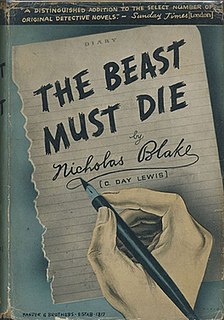
The Beast Must Die is a 1938 detective novel by Cecil Day-Lewis, written under the pen name of Nicholas Blake. It combines elements of the inverted thriller with a classic Golden Age-style investigation. It is the forth in a series of novels featuring the private detective Nigel Strangeways.



















